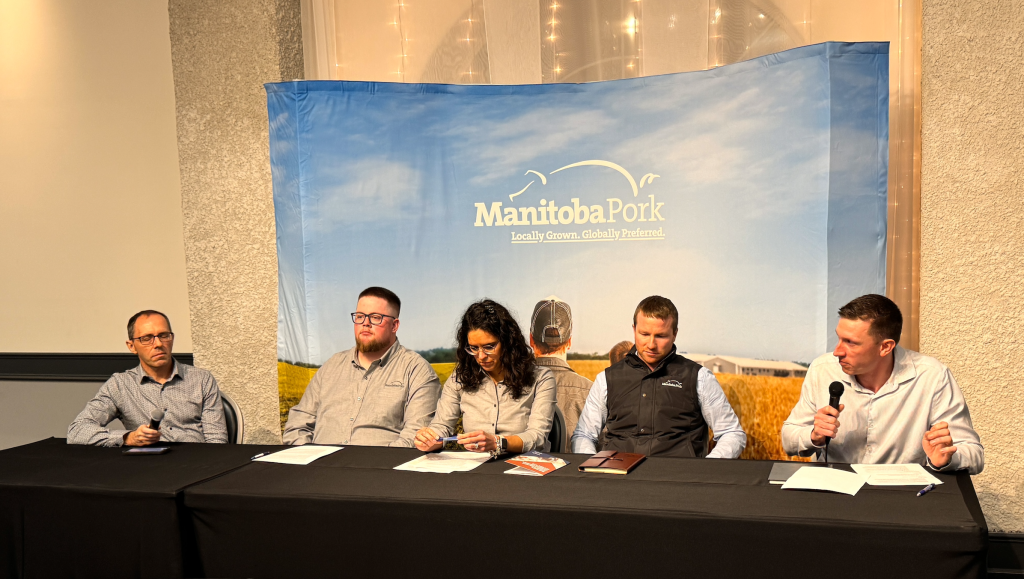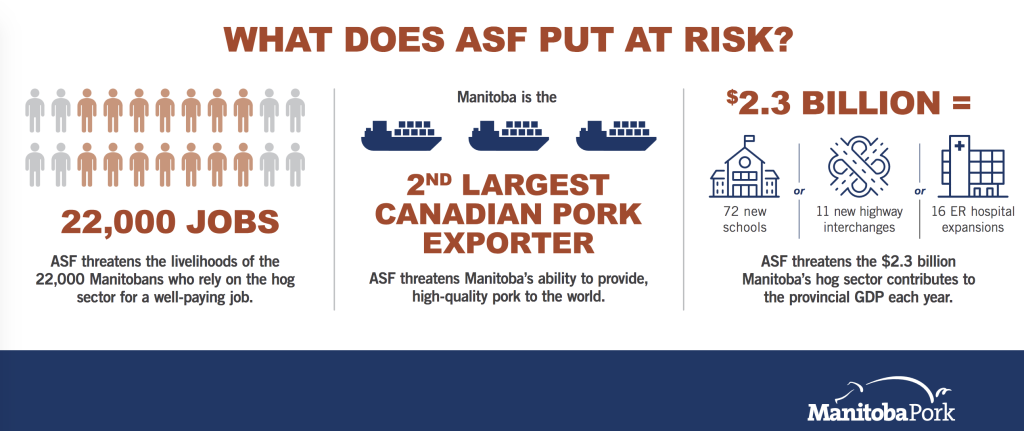
In November, Manitoba Pork hosted its annual Fall Producer Meetings in Niverville and Portage la Prairie, offering an opportunity to engage with producers and tackle critical issues facing the industry. The meetings featured in-depth discussions on African Swine Fever (ASF) planning and preparedness, government funding opportunities, and updates on Manitoba Pork’s ongoing initiatives across its program areas.
A key focus was Manitoba Pork’s ASF Integrated Emergency Response Plan, a comprehensive resource developed in collaboration with Manitoba Agriculture. This plan outlines proactive and reactive measures designed to mitigate the impact of ASF, ensuring producers have the tools and knowledge to protect their operations.
By addressing these pressing topics, Manitoba Pork reaffirmed its commitment to supporting producers and safeguarding the province’s vital hog sector.
While a dedicated panel focused on this critical topic, Manitoba’s African Swine Fever Integrated Emergency Response Plan is the title of the comprehensive preparation manual published by Manitoba Pork.
ASF poses a significant threat to Manitoba’s hog industry, which accounts for 90 per cent of its production as exports. If trade ceases due to an outbreak, Manitoba’s $2.3 billion contribution to the GDP will vanish, along with the 22,000 high-quality jobs the hog sector supports.
To mitigate such risks, Manitoba Pork and Manitoba Agriculture have a long-standing partnership to proactively address animal health and welfare challenges. Together, they have developed an integrated emergency response plan funded by the Government of Canada’s African Swine Fever Industry Preparedness Program. This plan outlines proactive and reactive measures to manage ASF and other large-scale emergencies.
Manitoba Pork emphasizes the importance of producers knowing the plan, its implications, and the steps they need to take in the event of an outbreak. The collaborative efforts ensure Manitoba remains prepared to protect its vital hog sector and the livelihoods it supports.
Todd Bergen-Henengouwen, a farmer, consultant, and researcher at Serecon Consulting near Picture Butte, Alberta, moderated the panel at the MP producer meetings preparing for African Swine Fever.
Bergen-Henengouwen’s goal was to create a dynamic and engaging discussion environment. His approach focused on fostering a natural conversation rather than delivering a formal presentation. “It’s about having the experts in the room share their insights on the topics they’ve built and developed instead of me standing up there talking about the project for an hour.” His role was to guide the discussion and ensure the audience understood the work comprehensively, highlighting the collaborative efforts behind the project.
Bergen-Henengouwen, involved in these types of projects for quite a few years, took on this project to assist with developing the Integrated Emergency Response Plan, specifically to facilitate coordination and guide the plan’s development. “They brought me in as a consultant to help with some of that work, and it’s been great working with them as part of this initiative,” he added.
Bergen-Henengouwen highlighted several critical takeaways for producers from the panel discussion on Manitoba’s African Swine Fever Integrated Emergency Response Plan. First, he praised the Manitoba pork sector for developing a robust emergency response structure capable of being deployed in a crisis. “There’s a system in place that can respond to this type of situation,” he noted.
Second, he emphasized ongoing efforts to develop depopulation and disposal techniques producers could use in emergencies. While hoping such measures would never be necessary, he acknowledged the significant thought and planning that have gone into preparing for such scenarios.
Lastly, Todd stressed the importance of early action and listening to industry experts during an emergency. “If Manitoba Pork or Manitoba Agriculture is asking producers to take certain steps in response to a disease detection, it’s crucial to heed that advice and implement their recommendations.”
Reflecting on the audience’s response, Todd observed engagement despite the topic’s grim nature. “The goal is to raise awareness of the risks, but also to show there are solutions and ongoing efforts to assist in these situations,” he said. •
— By Harry Siemens






